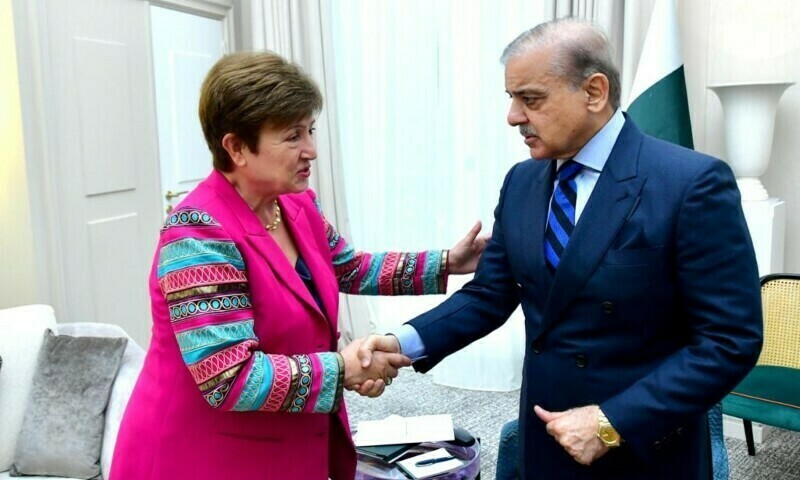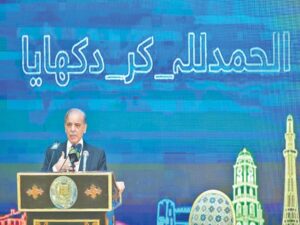The board of the International Monetary Fund on Wednesday agreed to loan Pakistan $7 billion to bolster its faltering economy, approving a relief package that the Prime Minister Shehbaz Sharif-led government has pledged would be the last from the Washington-based lender.
The three-year programme “will require sound policies and reforms” to support Pakistan’s ongoing efforts to strengthen its economy “and create conditions for a stronger, more inclusive, and resilient growth,” the IMF said in a statement.
The government in July agreed to the deal — its 24th IMF payout since 1958 — in exchange for unpopular reforms, including widening its chronically low tax base.
Pakistan last year came to the brink of default as the economy shrivelled amid political chaos following catastrophic 2022 monsoon floods and decades of mismanagement, as well as a global economic downturn.
The government was saved by last-minute loans from friendly countries as well as an IMF rescue package, but its finances remain in dire straits, with high inflation and staggering public debts.
“This programme should be considered the last program,” premier Sharif said in July when the loan deal was agreed.
The finance ministry wrangled for months with IMF officials to unlock the new loan.
It came on the condition of far-reaching reforms including hiking household bills to remedy a permanently crisis-stricken energy sector and uplifting pitiful tax takings.
In a country of over 240 million people where most jobs are in the informal sector, only 5.2m filed income tax returns in 2022.
The IMF said Pakistan “has taken key steps to restoring economic stability with consistent reforms.” But “despite this progress, Pakistan’s vulnerabilities and structural challenges remain formidable,” it warned.
“A difficult business environment, weak governance, and an outsized role of the state hinder investment, which remains very low compared to peers,” it added.
The development was also announced earlier by the PM’s Office.
Shortly after the announcement, Prime Minister Shehbaz Sharif met with IMF chief Kristalina Georgieva in New York and expressed his gratitude for the approval of the loan package.
After their meeting, the IMF boss expressed her approval of Pakistan’s economic progress. She congratulated both the government and the people for implementing key reforms, which facilitated the IMF’s approval of the program.
“We do have good news. We have completed the review of the programme successfully. I want to congratulate the government of Pakistan and the people of Pakistan for moving forward with the home-defined, Pakistan’s own reforms, and they are bringing fruits,” Ms Georgieva stated. “Growth is up, inflation is down, and the economy is on a sound path.”
When asked if these reforms were benefiting Pakistan’s poorer citizens, she responded, “I do sense that this is happening. The government aims to collect taxes from the rich and is strengthening the Benazir [Income Support] programme to support the poor.”
The PM Office statement said the premier expressed his satisfaction with the programme’s approval.
“The implementation of economic reforms is going on rapidly,” he said, adding that the government would continue to work hard to achieve goals related to economic development after achieving economic stability.
The prime minister said the increase in business activities and investment in the country was “welcome and a testament to the hard work of the economic team”.
“Along with the successes on the diplomatic front, the increase in remittances from Pakistanis living abroad is a reflection of their confidence in the government’s policies,” he said, adding that the government was grateful to the Pakistani community.
“If the same hard work continues, God willing, this will be Pakistan’s last IMF programme,” PM Shehbaz said.
The premier thanked Saudi Arabia, China, and the UAE for their support regarding the package, as well as IMF Managing Director Kristalina Georgieva and her team.
Speaking to reporters in New York, PM Shehbaz expressed optimism, reiterating his hope that this would be Pakistan’s final IMF-backed programme. “We are committed to ensuring this is the last time we seek such financial support from the IMF,” he said.
Ahead of the board’s approval, he assured the nation that the IMF agreement was in its final stages. “The IMF had set stringent conditions, and we have fulfilled them all,” he said, crediting China for its continued support and expressing gratitude to Saudi Arabia and the UAE for their essential contributions.
PM Shehbaz acknowledged the economic difficulties faced by his government when it took office but expressed confidence that the country was moving toward recovery. “With the grace of God and the combined efforts of the government and all institutions, we have overcome significant challenges,” he said.
Citing recent assessments by global rating agencies, the prime minister pointed to gradual improvements in key economic indicators, suggesting that Pakistan’s financial outlook was beginning to improve.











